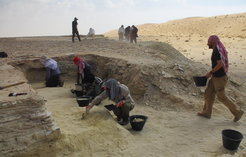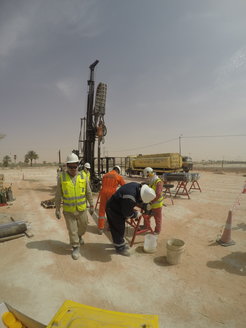Unravelling the Pattern, Impacts and Drivers of Early Modern Human Dispersals from Africa
Michael Petraglia and team receive grant from Leverhulme Trust to study early human dispersals out of Africa.
A team of researchers has been awarded a grant by the Leverhulme Trust to explore the migrations of humans out of Africa. The project, led by Simon Blockley of Royal Holloway, University of London, Michael Petraglia of the Max Planck Institute for the Science of Human History, Simon Armitage of Royal Holloway, University of London, and Chris Stringer of the British Natural History Museum begins July 1, 2017, and is titled “Unravelling the pattern, impacts and drivers of early modern human dispersals from Africa.”

Over the next three years the research team will examine a range of important archaeological and environmental sites across the Levant and the Arabian Peninsula in close collaboration with expert archaeologists and scientists from across the region and also from leading research centers in Europe. The main aim of the project is to resolve uncertainties about the chronology of early human dispersals Out of Africa. New environmental and archaeological information will be coupled with genetic evidence to resolve our understanding of the drivers behind the global distribution and dominance of our species.

Petraglia has extensive experience in the Middle East, particularly through his work in Arabia as part of his recent ERC-funded Palaeodeserts project. He and his interdisciplinary team will focus on the environments and archaeology of Arabia, investigating palaeo-lakes, caves and drilling locations to examine environmental change and how human populations expanded and contracted in response to fluctuating wet and arid phases over the past 125,000 years. Together with Petraglia, a new postdoctoral fellow in geoarchaeology will integrate the Arabian findings with the wider project goals.

